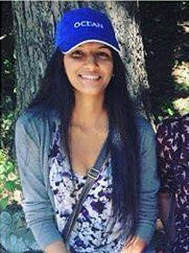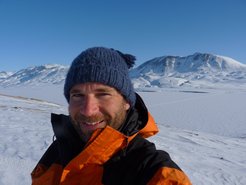
Current Students
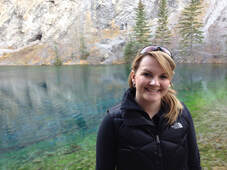
Dr. Kristin Eccles, postdoctoral fellow
Kristin is combining her expertise in biomonitoring, ecotoxicology and geoinformatics to assess spatial and temporal patterns of tree-ring mercury as a proxy for atmospheric Hg(0).
Kristin is combining her expertise in biomonitoring, ecotoxicology and geoinformatics to assess spatial and temporal patterns of tree-ring mercury as a proxy for atmospheric Hg(0).
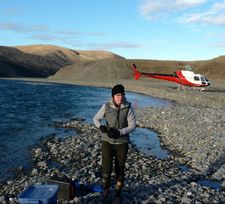
Danielle Lemire, MSc candidate (Physical Geography)
Danielle is using ice and sediment cores to study temporal trends in the atmospheric deposition and accumulation of mercury in Arctic watersheds. Danielle is particularly interested in determining whether the accelerated melting of glaciers is releasing legacy mercury previously stored in cryospheric and terrestrial compartments, thus creating an additional input of this contaminant to downstream lakes and aquatic foodwebs.
Danielle is using ice and sediment cores to study temporal trends in the atmospheric deposition and accumulation of mercury in Arctic watersheds. Danielle is particularly interested in determining whether the accelerated melting of glaciers is releasing legacy mercury previously stored in cryospheric and terrestrial compartments, thus creating an additional input of this contaminant to downstream lakes and aquatic foodwebs.
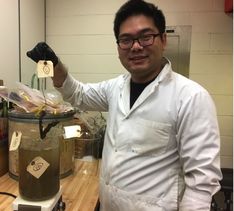
Alvin Xiong, MSc candidate (Physical Geography)
Alvin studies a particular class of contaminants called perfluorinated alkyl substances (PFASs). More specifically, his research aims to identify the sources of PFASs and how these chemicals bioaccumulate and biomagnify in the seal foodweb of Lake Melville, Labrador. This ecosystem is undergoing environmental change due to hydroelectric reservoir creation (and climate change) and Alvin's research will provide valuable information to local indigenous communities who consume locally caught fish and seals.
Alvin studies a particular class of contaminants called perfluorinated alkyl substances (PFASs). More specifically, his research aims to identify the sources of PFASs and how these chemicals bioaccumulate and biomagnify in the seal foodweb of Lake Melville, Labrador. This ecosystem is undergoing environmental change due to hydroelectric reservoir creation (and climate change) and Alvin's research will provide valuable information to local indigenous communities who consume locally caught fish and seals.
Alumni
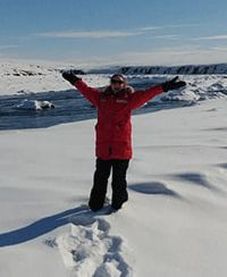
Stephanie Varty, MSc (Physical Geography)
The objectives of Stephanie's research are to identify hotspots of methylmercury production and degradation in Arctic catchments. Her field site is located near Lake Hazen (NU), in the Skeleton Lake subcatchment, which includes permafrost seeps, streams, lakes, ponds, and wetlands and allows her to examine the fate of methylmercury as it is transported downstream along the terrestrial-freshwater interface. Stephanie's research is also generating unique data on mercury cycling during the ice-covered season in Arctic lakes, which will provide insights into the impacts of climate change on methylmercury exposure in freshwater foodwebs.
The objectives of Stephanie's research are to identify hotspots of methylmercury production and degradation in Arctic catchments. Her field site is located near Lake Hazen (NU), in the Skeleton Lake subcatchment, which includes permafrost seeps, streams, lakes, ponds, and wetlands and allows her to examine the fate of methylmercury as it is transported downstream along the terrestrial-freshwater interface. Stephanie's research is also generating unique data on mercury cycling during the ice-covered season in Arctic lakes, which will provide insights into the impacts of climate change on methylmercury exposure in freshwater foodwebs.
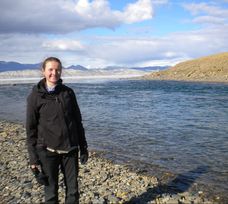
Victoria Wisniewski, MSc (Physical Geography)
Victoria's research focuses on ecosystem metabolism and carbon cycling in Arctic lakes, and particularly on determining how climate-driven changes, such as lake ice cover, will impact these key processes which are essential to maintaining healthy aquatic foodwebs. Victoria is using a combination of in situ sensors and dissolved oxygen stable isotope techniques to achieve her objectives.
Victoria's research focuses on ecosystem metabolism and carbon cycling in Arctic lakes, and particularly on determining how climate-driven changes, such as lake ice cover, will impact these key processes which are essential to maintaining healthy aquatic foodwebs. Victoria is using a combination of in situ sensors and dissolved oxygen stable isotope techniques to achieve her objectives.
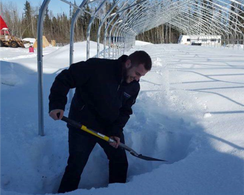
Kevin Jakiela, MScSM (Class of 2017)
Kevin is a student in the MSc. in Sustainability Management program at the Institute for Innovation and Management at UTM. His research objective is to use micrometeorological and soil quality measurements to optimize crop yields in geodesic greenhouses built specifically for cold climates. Kevin partnered with the Northern Farm Training Institute in Hay River (NWT) to complete his field work, and as he nears completion of his degree, he looks set to continue working in the area of food security with his start up company Just Vertical, facilitating urban agriculture.
Kevin is a student in the MSc. in Sustainability Management program at the Institute for Innovation and Management at UTM. His research objective is to use micrometeorological and soil quality measurements to optimize crop yields in geodesic greenhouses built specifically for cold climates. Kevin partnered with the Northern Farm Training Institute in Hay River (NWT) to complete his field work, and as he nears completion of his degree, he looks set to continue working in the area of food security with his start up company Just Vertical, facilitating urban agriculture.
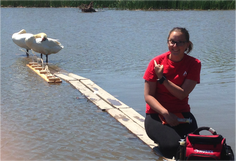
Courtney Soden, MSc. (co-supervised with Prof. Yuhong He)
Courtney completed her MSc. in 2016 on the effects of restoration on air-water exchange of greenhouse gases from a coastal marsh along the shores of Lake Ontario.
Courtney completed her MSc. in 2016 on the effects of restoration on air-water exchange of greenhouse gases from a coastal marsh along the shores of Lake Ontario.
Jacquelyn Wood, BSc. (Honour's thesis student, 2018-2019)
For her Honour's Thesis research,Jacquelyn used dated lake sediment cores to investigate whether forest fires increase inputs of terrestrial mercury to subarctic lakes.
For her Honour's Thesis research,Jacquelyn used dated lake sediment cores to investigate whether forest fires increase inputs of terrestrial mercury to subarctic lakes.
Justin Van Houten, BSc. (Honour's thesis student, 2018-2019)
Justin's Honour's Thesis research focused on the development of models to estimate mercury and methylmercury concentrations in river water from basic water quality parameters (e.g., turbidity, dissolved organic matter concentration) that can be measured frequently and cheaply in order to improve estimates of mercury inputs from rivers into lakes.
Justin's Honour's Thesis research focused on the development of models to estimate mercury and methylmercury concentrations in river water from basic water quality parameters (e.g., turbidity, dissolved organic matter concentration) that can be measured frequently and cheaply in order to improve estimates of mercury inputs from rivers into lakes.
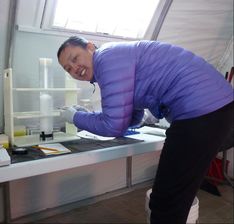
Catherine Wong, BSc (Research Assistant, 2015)
